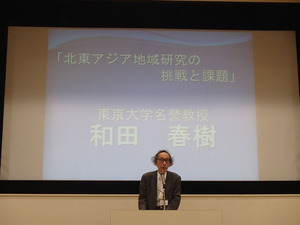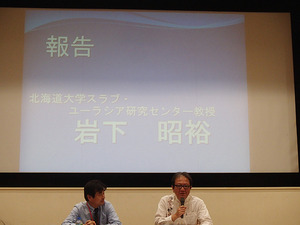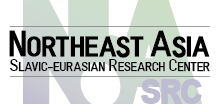The National Institutes for the Humanities "Northeast Asia Area Studies Project" which involves 5 institutions including the National Museum of Ethnology (MINPAKU), Center for Northeast Asian Studies of Tohoku University, Center for Far Eastern Studies of Toyama University, Institute for North East Asian Research (NEAR) of the University of Shimane Prefecture and the Slavic-Eurasian Research Center (SRC) of Hokkaido University. Within this project team, the SRC is responsible for the "international relations for the construction of inter-regional cooperation in Northeast Asia"
On May 28-29, the kick off conference titled "Challenges to the Northeast Asia Regional Studies" for the SRC project unit took place in cooperation with the NEAR at the University of Shimane Prefecture. The two day conference started off with the keynote speech by Professor Emeritus at the University of Tokyo, Haruki Wada, titled "Prospects and Challenges to Northeast Asia Regional Studies". Professor Wada touched upon the positionality of the Northeast Asian region and touched upon how the region itself was constructed in history. The presentation looked at the obstacles that hinder further cooperation in this region which include the North Korean issue, rise of China and traditional bilateral security regimes. Furthermore, the unhealed scars of the past and other historical issues including the comfort women and reconciliation and territorial issues are issues that remain to be resolved. However, there is a glimmer of hope in which the countries of Northeast Asia could and should cooperate on, such as emergency response to natural and man-made disasters, environmental issues as well as economic institutions.
The keynote speech was followed by two commentaries by the Director of NEAR, Atsushi Inoue and SRC's very own Akihiro Iwashita. Atsushi Inoue touched upon the creation of modern space and identity in the Northeast Asian region and how that could be new perspective in approaching the region, and Akihiro Iwashita's posed a rather provocative comments on the possibility of a breakthrough within the Northeast Asian region through a bilateral security alliance between Japan and Korea.
In the discussion, issues such as strategic partnership, the fluidity within the Northeast Asian region, as well as the network of the Korean diaspora were brought up by members of the project unit. All of the issues raised by the project members pose as keywords and possible directions for the project at hand. The next project conference is scheduled to take place in Kokura in Kita-Kyushu in December. (Written by: Naomi Chi)


 Eurasia Unit for Border Research (Japan)
Eurasia Unit for Border Research (Japan)




